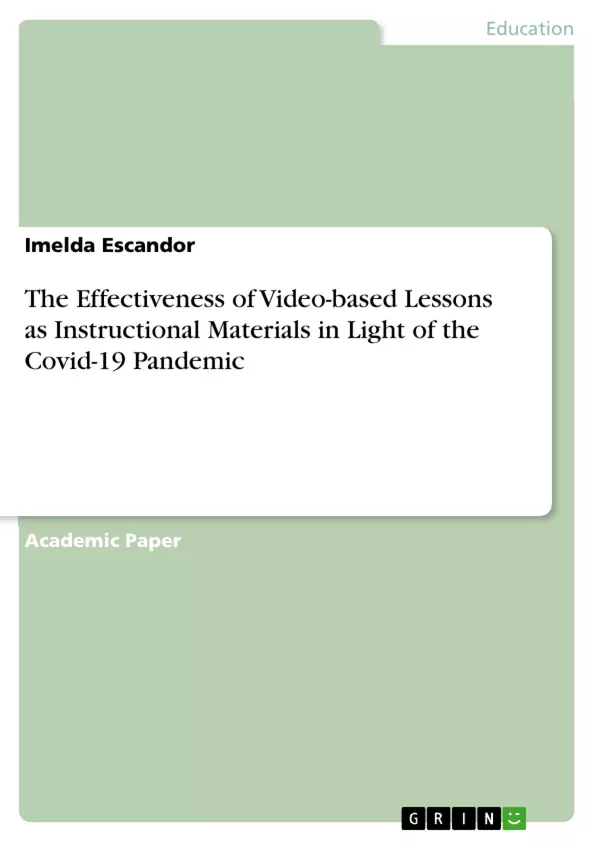This study aims to determine the level of effectiveness of video-based lessons as instructional learning material for pupils, as perceived by teachers in schools.
Although it was revealed that video-based lessons as one of the instructional tools is rated as very effective by teachers, there are problems encountered in the utilization of them for pupils amidst the pandemic. These include lack of knowledge on how to utilize video-based lessons as a classroom tool, lack of instructional materials such as laptops and cellphones, that can be used in accessing the video-based information, difficulty in creating video-based lessons due to poor internet connections, short attention span among learners and big expenses on the part of pupils, especially during a pandemic, where not all pupils can afford to buy phones.
The study successfully surfaced some teachers’ solutions to resolve the problems in the utilization of video-based lessons as instructional learning materials, such as asking for assistance from an ICT Coordinator or well-trained teachers on how to learn to create and use video-based materials for teaching purposes, knowing the needs of learners. Also, watching YouTube videos to gain different ideas on how to create interactive, short video-based lessons to address pupils who have a short attention span while watching lessons and attending online training, relative to the development and utilization of video-based lessons to equip them with the skills in teaching classes in modern ways.
Both quantitative and qualitative methods were used in the study. The respondents of the study were fifteen elementary teachers. A purposive sampling technique was utilized. Interviews, Survey Questionnaire, Participant Observation, and Focus Group Discussion were the methods employed.
Table of Contents
- ABSTRACT
- ACKNOWLEDGEMENT
- INTRODUCTION AND RATIONALE
- LITERATURE REVIEW
- RESEARCH QUESTIONS
- SCOPE AND LIMITATIONS
- Sampling
- Data Collection
- Ethical Issues
- Plan for Data Analysis
- RESEARCH METHODOLOGY
- DISCUSSION OF RESULTS AND RECOMMENDATIONS
- LEVEL OF EFFECTIVENESS OF VIDEO-BASED LESSON AS INSTRUCTIONAL LEARNING MATERIALS OF PUPILS AS PERCEIVED BY TEACHERS
- PROBLEMS ENCOUNTERED BY TEACHERS IN THE UTILIZATION OF VIDEO-BASED INSTRUCTION AS INSTRUCTIONAL LEARNING MATERIALS FOR PUPILS AMIDST PANDEMIC
- SOLUTIONS EMPLOYED BY TEACHERS TO RESOLVE THE PROBLEMS IN THE UTILIZATION OF VIDEO-BASED INSTRUCTION AS INSTRUCTIONAL LEARNING MATERIALS
- CONCLUSIONS AND RECOMMENDATIONS
- TIMETABLE/GANTT CHART
- PLANS FOR DISSEMINATION AND ADVOCACY
- REFERENCES
- FINANCIAL REPORT
- SURVEY QUESTIONNAIRE
Objectives and Key Themes
This study aims to evaluate the effectiveness of video-based lessons as instructional materials for pupils in Gubat South Central School. The study explores the perspectives of teachers on the effectiveness of these materials, identifying potential challenges and solutions related to their implementation.
- The level of effectiveness of video-based lessons as perceived by teachers.
- The challenges faced by teachers in utilizing video-based lessons in the context of the COVID-19 pandemic.
- The solutions implemented by teachers to address these challenges.
- Recommendations for improving the use of video-based lessons in the classroom.
- The role of technology and teacher training in enhancing the effectiveness of video-based lessons.
Chapter Summaries
- ABSTRACT: This section provides a concise overview of the study's purpose, methodology, findings, and recommendations. It highlights the effectiveness of video-based lessons in enhancing learning, while acknowledging challenges related to teacher training and access to technology.
- ACKNOWLEDGEMENT: This chapter expresses gratitude to individuals who contributed to the research, including school administrators, teachers, and colleagues.
- INTRODUCTION AND RATIONALE: This section introduces the context of the study, highlighting the importance of video-based learning resources in the contemporary educational landscape. It provides a rationale for investigating the effectiveness of these resources in the context of the COVID-19 pandemic.
- LITERATURE REVIEW: This chapter reviews existing research on the use of video-based learning resources in education, focusing on their advantages and limitations. It provides theoretical underpinnings for the study's investigation.
- RESEARCH QUESTIONS: This section outlines the specific research questions that guide the study's investigation. These questions focus on the effectiveness of video-based lessons, challenges faced by teachers, and solutions implemented to address these challenges.
- SCOPE AND LIMITATIONS: This chapter clarifies the scope of the study, defining the target population and the specific context of the research. It also acknowledges any limitations that may affect the generalizability of the findings.
- RESEARCH METHODOLOGY: This section describes the methods used in the study, including the sampling techniques, data collection methods, and data analysis procedures. It provides details on the research design, participant selection, and the instruments used to gather information.
- DISCUSSION OF RESULTS AND RECOMMENDATIONS: This chapter presents the findings of the study, analyzing the effectiveness of video-based lessons as perceived by teachers. It explores the challenges encountered by teachers and the solutions they have employed to address these issues. The chapter also presents recommendations for enhancing the use of video-based lessons in the classroom, emphasizing the need for teacher training and technological support.
Keywords
This study focuses on the effectiveness of video-based lessons in the context of the COVID-19 pandemic. It explores the perspectives of teachers, examining their experiences with these resources, the challenges they face, and the solutions they have implemented to address those challenges. Key concepts explored include instructional materials, technology integration, teacher training, and the impact of the pandemic on education.
- Quote paper
- Imelda Escandor (Author), 2022, The Effectiveness of Video-based Lessons as Instructional Materials in Light of the Covid-19 Pandemic, Munich, GRIN Verlag, https://www.grin.com/document/1248070



